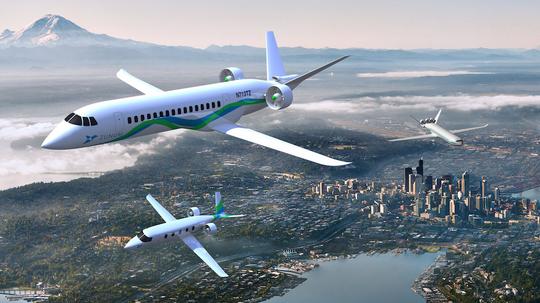
A University of Illinois Urbana-Champaign engineering professor is behind a hybrid and electric air travel startup that aims to cut flight costs, reduce aircraft emissions and connect travelers to more frequent regional flights.
Kiruba Haran, an electrical engineering professor at UIUC, is one of the cofounders of Zunum Aero, a Kirkland, Wash.-based startup that's aiming to get electric airplanes flying nationwide by the early 2020s. Zunum Aero just came out of stealth this week, with funding from Boeing's new venture capital arm HorizonX as well as JetBlue Technology Ventures.
Their initial hybrid gas-electric aircrafts would have a range of around 700 miles, carry between 10 to 50 passengers and hop more frequently between regional airports (the US has around 5,000 of these often underutilized smaller aviation hubs). Zunum Aero is aiming for a 40 percent decrease in travel time on the busiest routes, and 80 percent on less traveled routes, with a corresponding ticket price cut. Initially their hybrid-gas planes could generate 80 percent less emissions (and they're pushing towards zero emissions as they go all-electric). By 2030, they're hoping to fly planes over 1,000 miles.
Haran, who is leading electric drive development for Zunum Aero, has been working with NASA on high power density motors for electric-hybrid aircrafts for the past three years. That's what led him to Zunum Aero's other cofounders Ashish and Matt Knapp.
"The electric machine technology we have developed looked like a good fit, and I decided to join the team to try and make commercial, hybrid-electric regional jets a reality," he told Chicago Inno over email.
Zunum Aero is also partnering with the Center for Power Optimization of Electro-Thermal Systems (POETS), a research group that's led by UIUC and made up of researchers from Howard University, Stanford University and University of Arkansas. The goal of POETS is to "increase the power density of current mobile electrified systems by 10-100 times over current state of the art systems." In other words: Get batteries to the power density necessary to potentially power an aircraft over a short haul flight.
Haran will be based in Illinois for the time being to leverage research at POETS, as well as the Grainger Center for Electromechanics and related NASA programs at UIUC. He added that some of the subsystem technology could be tested in Illinois, and when it comes time to picking Zunum Aero's routes he noted he could think of "many cities around us that could be connected directly by air that don’t have such service today."
The electric machines may be the 'jet engines' of the 21st century
Leveraging top tech talent and cutting edge research will be key to getting Zunum Aero's planes off the ground (quite literally). While Haran noted key electrical components, such as motors, drives and batteries, are just beginning to get to the size and weight at which their vision for electric airplanes are feasible, there are plenty of engineering challenges ahead.
"Many challenges remain - the electrical distribution, protection and fault tolerance, airplane integration, thermal management, controls; but these are all being attacked by various groups," he said.
But if Zunum Aero can crack these problems, it could mean major changes for air travel and the aviation industry at large.
"The electric machines may be the 'jet engines' of the 21st century," Haran said.








